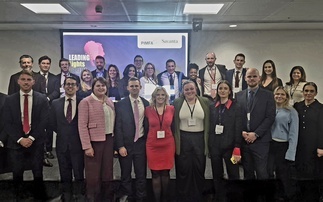
COVER editor John Brazier offers some tips on how to craft award entries that will the get attention of judges and show organisations or individuals in the best possible light.
I've been involved in awards programmes in financial services more times that I can count and I dread to think of how many entries I must have read in total. Thousands, potentially tens of thousands, of them.
Getting the balance right on an entry is tricky; it needs to be engaging but not boastful, insightful without becoming too dry, to the point without being a list of facts and figures. But there are consistent elements that form the foundations of a great entry that stands out from the good ones.
So, here are some of the key things to think about when writing your next award entry:
Understand your proposition
It sounds simple, but a full understanding of exactly what you're talking about goes a long way when it comes to award entries. If you don't know all the ins and outs of your proposition, whatever that might be, it will show in the finished article. Do your research, check the details twice and ensure that the finished entry doesn't undersell your proposition.
Get experts to write entries
Following on from the first point, having someone with the subject expertise is crucial to constructing a quality entry. Of course, this isn't always possible for the smaller shops in the market but having the experts writing entries makes all the difference.
It's tempting to hand the task off to marketing along with a factsheet, especially if you are entering multiple categories, but remember that this is not an exercise in marketing - this is about detailing why your proposition, organisation or individual deserves to be recognised by industry peers. Judges don't want to read a pitch full of information they could easily find on your website.
Read the criteria, then again and again
Three is the magic number, so it's probably the minimum number of times you should read the entry criteria for the category. Judges are particularly observant on why a company or individual has entered, so if yours doesn't meet the criteria, you can expect the judges to pick up on it.
If you don't know what the criteria for your entry are, you've already lost ground to competitors who have taken the time to examine what the judges are asking to see. Revert back to the criteria while putting the entry together to make sure you're staying on track.
Focus on the details
The entry forms for COVER awards programmes have a word limit for good reason - namely that we're all busy people who don't have time to read dissertations. 500-600 words may seem constrictive, but if you can focus on the real achievements or values the entry has to offer it's more than enough.
We really don't need to know about your company's history - particularly if you're one of the largest insurance providers out there. It's padding and is more harmful than helpful. Get straight to the point and be as succinct as possible; don't bury the lede (yes, that's spelled correctly) with unnecessary waffle.
And don't take the supporting documentation as an opportunity to submit a 17-page PDF where all the good stuff is. Judges won't look through it all, so ensure that the real gold is in the main section of your entry or it could be lost entirely.
Data needs context
Facts and statistics are great ways to illustrate achievement and should form the backbone of your entry. Judges will often use this data to separate the good from the great or even decide winners in categories with tough competition.
However, they also need to be used properly and here context is king. Data presented in isolation is at best annoying and at worst detrimental to an otherwise well-crafted entry. If you're presenting growth statistics, you need to evidence the starting point; simply stating something rose 18% over the past 12 months provides little insight for judges.
Put some love into it
Take it from an editor - any piece of writing is better with a bit of love. Don't just hit the word limit and send it in; take a few runs at it and polish it until it shines. Eagle-eyed judges take note of entries containing errors or those that appear to have been written and submitted in one sitting - especially those that comprise a single paragraph (read: wall) of text or those that are cut/paste within different categories.
Having client feedback or testimonials from industry peers also goes a long way to underlining your entry's credentials, so get someone else to show you some love! Recognition from elsewhere carries significant weight for judges, but only if properly sourced and accredited.













